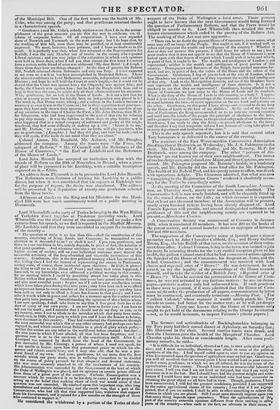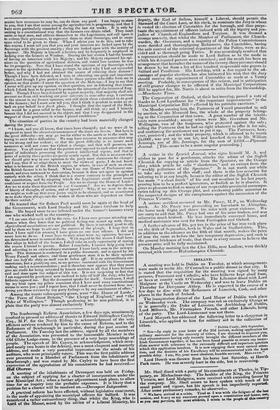The farmers and agriculturists of Buckinghamshire belonging to the Tory
party had their annual dinner at Aylesbury, on Saturday last ; Mr. Horwood in the chair. Several routine toasts were drunk, and then the Chairman gave the health of the Marquis of Chandos. Lord. Chandos spoke his thanks at considerable length. After some preli- minary remarks, he said- " It is difficult for an individual, situated as I am, to steer quite clear of poli- tics; and I must necessarily, therefore, now allude to sonic of the political questions of the day. I find myself called upon to state to you my opinion on what; has occurred upon the question of agriculture since we last met. Gentlemen, you will all recollect that for several years I have worked hard in your cause— in that cause, gentlemen, in which we are all inlisted, for it is the cause of the agriculturists of this county. Though I have been an unsuccessful labourer ia your cause, I tell you that I am not tired or fatigued, but that I am ready-to persevere in it to the last. But I should have had the greatest delight and satis- faction if I could have met you as an individual who had been successful in attaining the great object we all have had in view. Though, gentlemen, I have been unsuccessful, I still feel the greatest confidence, provided I am supported by the entire agricultural classes of the country; I say that if I am ported, that that if you are united, I shall be able to effect something to relieve the distress in which you are placed. Still I must most sincerely impress upon you that every thing depends upon yourselves. When the agriculturists of this part of the country entertain opinions different from those residing in other parts of the country—when such is the fact, no advocate in their cause, n He trusted that Sir Robert Peel would soon be again at the bead of the Government, with Lord Stanley and Sir James Graham to help him. He hoped soon to see inlisted under the farmer's banners every one who wished well to the country- " I am sure that such will be the case, for I have seen persons attending our dinners when they knew that no political feeling was mixed up with them. Agricultural associations are not political. By them is intended good to all, and by them we hope to advance the success of the plough. I hope that in what I have said this evening I have given no one man offence. I did not come here to do so. I came here to state what were my opinions, because I am determined never to conceal them. With regard to the means I shall here- after adopt in behalf of the farmer, I shall take an early opportunity of stating the course I intend to pursue. Before I conclude, I cannot help going back and adverting to an extraordinary statement I have lately seen in the newspa- pers. This statement is contained in a public document, and is signed by Sir lionry Parnell and others, and' those gentlemen state it to be their opinion that one half thc duty on malt can be taken off. It is an extraordinary cir- cumstance, but a gratifying one, to see persons connected with the Government making such a recommendation ; and it therefore now appears that they must give me credit for being actuated by honest motives in all that I have hitherto said and done upon the subject of this tax. It is not surprising to find that I am supported by gentlemen now inclined to take off half the duty, who have hitherto opposed me. But the document speaks for itself. Gentlemen, I shall lay my head upon my pillow conscious that I have used every constitutional means to serve you ; and I repeat here, that I shall never be diverted from ren- dering you those services by any party feelings or by any emoluments of office."
Among the toasts subsequently given, were "the House of Lords," "the Peers of Great Britain," "the Clergy of England," and "the Duke of Wellington." Though professing to be non-political, it is plain that the party was almost exclusively Tory.
matter how strenuous he may be, can do them any good. I am happy to state to you, that I see that union among the agriculturists is progressing, and that I have more particularly remarked it during the last six weeks. It is only by uniting in a constitutional way that the farmers can obtain relief. They must unite as loyal men, and address themselves to the Legislature, and call upon it to redress their grievances, to represent them to their Sovereign, and to cause some relief to be given to them. When I advise you to do this, and to take this course, I must tell you that you and your interests are looked upon by the Sovereign with the greatest anxiety ; they are looked upon with the anxiety of a farmer. his Majesty is himself a farmer, and he frequently is employed in /ooking over the farmers at Windsor. During the last session I had the honour of having an interview with his Majesty ; and his Majesty expressed his opi- nions on the question of agricultural distress, and stated how anxious he was for its prosperity. Now that I have stated the opinions of my Sovereign with respect to the agriculturists, I may, perhaps, be asked why I had not succeeded better, and why I had not obtained the means of relieving their distress ? Tbungh I have been defeated, as I was, in obtaining one great and important object, and though I give perfect credit to those persons who differ from me in opinion on that point—I mean the question of the Malt-tax—I beg to say that
never will give tip my opinion on that question, nor in following that course which I think best to be pursued to promote the interests of the fanners of Eng-
land. Though I have been defeated by a great majority, that majority shall not prevent me from still working out your interests in some other way. I continue to the utmost in my former opinions, and still think them calculated to do good to the farmers; but I must now tell you, that I think it prudent to make an at- tack on your behalf in a fresh place. I thought that the repeal of the Malt- tax would be a great relief to the farmer, and still think so ; and I bitterly lament that I did not succeed in the object, and that I was disappointed in the support of those gentlemen in whom I placed confidence."
The situation of parties in the country had been materially changed during the year-
" I know, and you all know, that times have changed ; and we must all be prepared to meet the altered circumstances of the times we live in. But here is the great difficulty—we may go too far either to the north or to the south in trying to meet these difficulties. We may have recourse to measures that may be too strong and too violent ; so that the great difficulty is to insure such measures as will not cause too violent a change, and that will preserve, not destroy. You all must see that the parties now opposed to each other are com- posed of individuals possessing the greatest intellectual vigour, and that in point of activity those parties are pretty nearly equal. But this is no reason why we should give way in our opinions to the party most clamorous for change ; and I say, that if we adapt them to meet the views of party, I do not know what is to become of the British empire, or where, in case of such an event, the British farmer is to be found. When I see one House of Parliament cen- sured, and even sentenced to destruction, because it dues not agree in opinion entirely with the other, I think that is a course contrary to the principles of the constitution, and by adopting which the Legislature could never insure confidence or respect from the People Are we to change the House of Lords ? Are we to make them dependent on t.,e Commons ? Are we to deprive them of liberty of thought, of action, and of speech? Why, if we were to do so, we might as well say that even juries ought to be changed, and so constituted as to make them always suit the wishes of those who are dependent on them for their verdict."



























 Previous page
Previous page